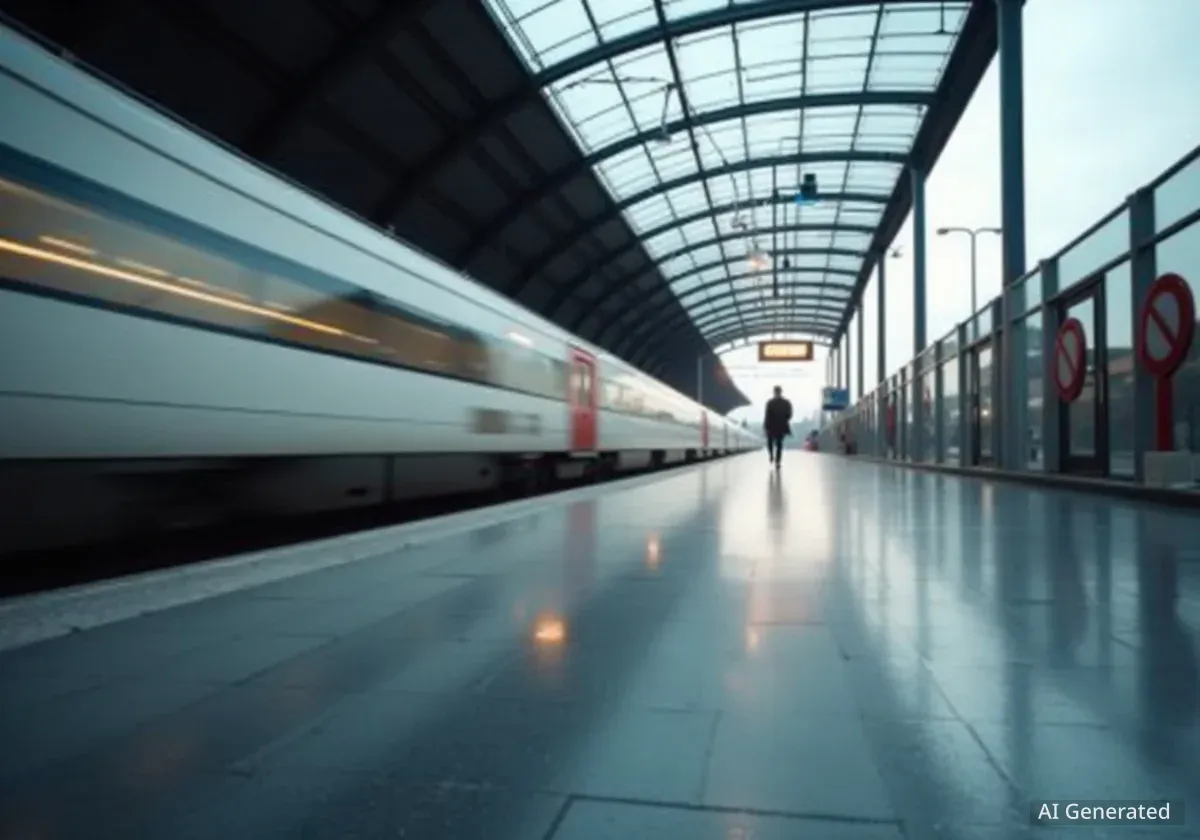Germany's state-owned railway company, Deutsche Bahn, has appointed Evelyn Palla as its new Chief Executive Officer. This marks the first time a woman will lead the company. Palla's appointment comes as Deutsche Bahn faces ongoing challenges, including frequent delays, train cancellations, and infrastructure issues. Her primary goal is to improve the railway's reliability and passenger experience.
Key Takeaways
- Evelyn Palla is the first woman to lead Deutsche Bahn.
- Her appointment aims to address persistent delays and service issues.
- The new punctuality target is 70% of trains on time by 2029.
- Billions of euros are allocated for infrastructure upgrades.
- Palla has a track record of improving regional transport at Deutsche Bahn.
New Leadership for a Challenged Railway System
Evelyn Palla, 51, an Austrian national, was introduced as the new CEO on Monday, September 22, 2025, in Berlin. Transport Minister Patrick Schnieder announced her appointment, outlining a new strategy to enhance Germany's rail network. Palla replaces Richard Lutz, who led the company since 2017.
The railway system has struggled with various issues for an extended period. These include significant delays, often lasting several hours, missed connections, and numerous train cancellations. Passengers have also reported concerns about the cleanliness of trains and stations, as well as the overall service quality.
Infrastructure problems are a major contributing factor. Decades of underinvestment have left tracks, signal boxes, and other critical components in disrepair. This has led to extensive track work, further impacting service reliability. The new leadership is tasked with tackling these systemic problems head-on.
"Today, we are taking up the baton for a new era. An era in which we will once again focus on what we do best: running trains, the railway as the lifeline of this country," Evelyn Palla stated during the press conference in Berlin.
Palla's Background and Experience
Evelyn Palla has been a member of the Deutsche Bahn board since 2019. From 2022, she was responsible for regional transport. During her tenure in this role, she successfully improved the performance of local transport services. This sector has recently become profitable and has attracted more customers, demonstrating her ability to enact positive change.
Her hands-on approach has also garnered appreciation from union representatives. Last year, Palla obtained her locomotive driver's license. She explained her motivation for this personal effort.
"I wanted to know what it feels like to sit in the driver's seat. And also to understand what our employees do every day and what our core business is all about," Palla said at the time.
Key Fact
Evelyn Palla is the first woman to hold the position of CEO at Deutsche Bahn, a significant milestone for the state-owned company.
Addressing Punctuality and Infrastructure
Minister Schnieder began the press conference by critiquing the previous management's punctuality targets. He described the goal of 75% to 80% on-time long-distance trains by 2027 as "nowhere near achievable."
A new, more realistic target has been set: 70% of trains should be on time by 2029. This adjusted timeline allows the railway more time to address critical infrastructure renovations. Many tracks and signal boxes have not been updated for decades, some dating back to the 19th century.
Current data underscores the urgency of these changes. In the first six months of this year, only 63.4% of long-distance trains in Germany arrived on time. The situation worsened in July, a key summer travel month, when punctuality dropped to just 56.1%. This means over 40% of long-distance trains were late during this period.
International Comparison
Germany's punctuality figures lag behind those of its neighbors. In Denmark and the Netherlands, approximately 90% of trains run on schedule. Switzerland boasts an even higher rate, with around 99% of trains arriving on time.
Minister Schnieder emphasized the broader implications of these railway issues. "Many people equate the dysfunctionality of the railways with the dysfunctionality of our state," he remarked. He added, "I find that extremely dangerous," highlighting the public perception of government effectiveness tied to train service.
Massive Investment in the Rail Network
Germany's national rail network spans approximately 33,500 kilometers (20,800 miles). As a state-owned entity, Deutsche Bahn relies on federal government subsidies. Critics argue that past governments have invested too little in infrastructure, leading to the current state of disrepair.
Many existing systems are worn out and outdated. They are often unsuitable for modern digitally controlled rail operations, which are planned to become standard. Upgrading these systems is crucial for future efficiency.
Minister Schnieder confirmed that the new railway management will proceed with plans to fully renovate about 40 important routes by 2036. One such project is the busy connection between Berlin and Hamburg. Work started in early August and is expected to finish by April next year. This upgrade alone is estimated to cost €2.2 billion ($2.6 billion).
Financial Commitment to Modernization
Last year, significant work was already undertaken. Approximately 2,000 kilometers of tracks and 2,000 switches were replaced. Around 150 bridges underwent repairs, and about 1,000 stations and stops were renovated. The total expenditure for these efforts was around €16.4 billion.
Looking ahead, Deutsche Bahn will receive billions more from the federal government's €500 billion special fund for infrastructure. This fund is intended to modernize the country's infrastructure over the coming years. Schnieder stated that legislation for this funding is still in progress, but detailed figures for Deutsche Bahn's allocation will be presented in the fall. A portion of this fund is also earmarked for accelerating Germany's digital infrastructure.
Investment Snapshot
- 2024 Renovations: 2,000 km of tracks, 2,000 switches, 150 bridges, 1,000 stations.
- Total Cost (Last Year): Approximately €16.4 billion.
- Future Funding: Billions from a €500 billion federal infrastructure fund.
Ongoing Challenges and Future Outlook
Despite the new leadership and financial commitments, Deutsche Bahn continues to face operational hurdles. The company reported a loss of €760 million for the first half of the year. While this represents a reduction of almost €1 billion compared to the previous year, it highlights the financial challenges ahead.
Even as the new CEO was being introduced, news emerged of severe train service restrictions in northern Germany due to an overhead line disruption. This incident led to the complete cancellation of ICE trains between Hamburg and Berlin. These trains were already being rerouted and experiencing longer travel times because of ongoing construction work on the route.
The appointment of Evelyn Palla and the renewed focus on infrastructure investment signal a determined effort to improve Germany's railway system. The coming years will demonstrate how effectively these plans can translate into a more reliable and punctual service for passengers.
The emphasis on realistic goals and substantial funding aims to restore public confidence in Deutsche Bahn. The success of these initiatives will be critical for Germany's overall transportation infrastructure and economy.





